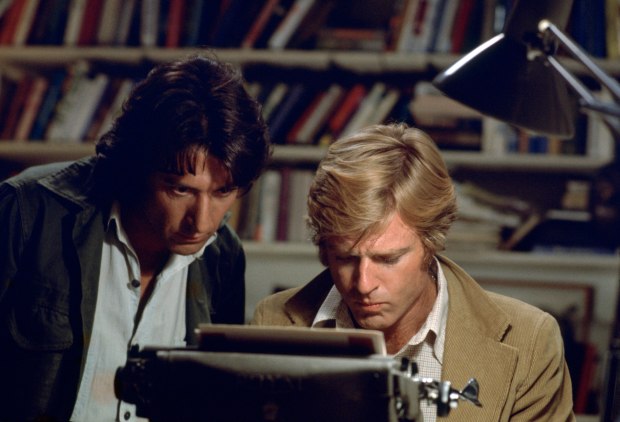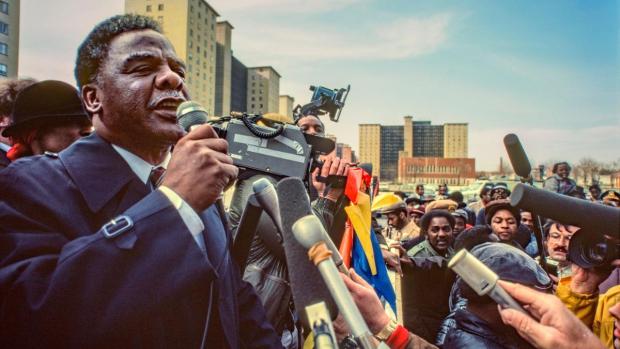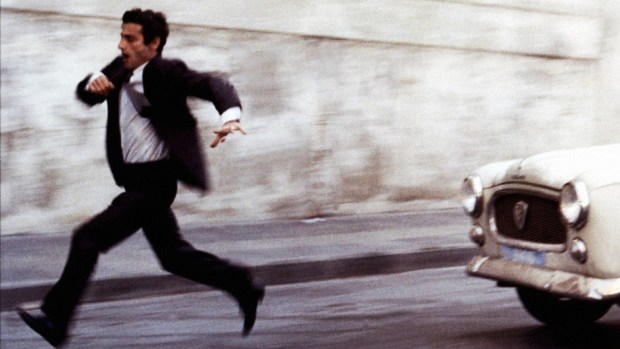Democracy’s forever imperiled. History cannot suggest otherwise. In silent movie terms, it’s “The Perils of Pauline” with political ideals, instead of a damsel in distress, getting tied to a railroad track by some metaphoric Snidely Whiplash antagonist.
And this, say the folks behind the upcoming Gene Siskel Film Center series “Democracy at Risk,” is reason enough to screen these four films at this time, weeks away from a presidential election even the most radically apolitical among us would describe as important.
Presented by the nonpartisan League of Women Voters of Chicago in conjunction with the Film Center operating under the School of the Art Institute of Chicago auspices, the series comes with the aim of getting out of the vote, however the votes fall.
“This program,” says Film Center director of programming Rebecca Fons, “isn’t on one side of the aisle or the other. The League of Women Voters is not affiliated with any particular party. But I will say this: The closer we get to November, the more urgent and momentous and poignant these films feel to me.”
Before we get to that word “poignant,” some basics for your calendar. The series opens 6 p.m. Sept. 16 with the Chicago story “Punch 9 for Harold Washington,” director Joe Winston’s 2021 documentary on what it took to get Washington elected as our city’s first Black mayor.
Next up, at 6 p.m. Sept. 18: director Alan Pakula’s 1976 docudrama “All the President’s Men,” with an Oscar-winning William Goldman screenplay (considerably revised by, among others, co-star Robert Redford). It’s the well-known and, for anyone employed by a newspaper, painfully nostalgic story of how two Washington Post reporters brought down a president. The nostalgia part, in part, comes from the reminder that the Watergate break-in, and subsequent cover-up regarding the Nixon administration’s illegal re-election activities, was enough to generate widespread bipartisan support for Nixon’s ouster. Archie and Edith Bunker were right: Those were the days.
Then comes “Z,” director Costa-Gavras’ rattling political thriller from 1969, less well known today but a huge commercial and critical success at the time. It’s based largely on the 1963 assassination of left-wing Greek activist Gregoris Lambrakis, and stars Yves Montand as the fictionalized antiwar dissident whose murder is covered up by political and military authorities. But not forever. “Z” screens 6 p.m. Sept. 20.
The series winds up with “A Face in the Crowd,” director Elia Kazan’s 1957 critique of homespun proto-fascists, American style. Andy Griffith, pre-Mayberry, lights the match with a combustible performance as Lonesome Rhodes, transformed from down-and-out nobody into a radio, TV and eventual political force of craven desires and dangerous intent. Kazan’s film, costarring Patricia Neal, Walter Matthau and Lee Remick, screens one time only, like the others in this series, at 2 p.m. Sept. 21.
Programming director Fons describes “A Face in the Crowd” as “a bitter pill,” one that many see as prescient every four or eight years on average. Others, both liberal and conservative, find it to be a panderer to left-wing smugness; critic Tom Carson, writing in 2018, was by then good and sick of all the think pieces being written in the aftermath of Trump’s 2016 victory. “Admiring any cautionary tale’s uncanny anticipation of real-world events,” Carson wrote, “amounts to saying the work failed in its educational purpose.” Even so Carson noted that “nowadays, liberals have every right to feel as unnerved by Trump’s malignant brand of populism as ‘A Face in the Crowd’ tells them they should have been all along.” And that was six years ago.
Every political cycle, there’s a hunger for cautionary tales from the past. We look backward to make some sense of the uncertain now. In the 1950s, a handful of great directors working with A-list stars put some genuine provocations into production, often on the intertwined subjects of political rot and a corrosive, amoral American media, at the bright, profitable dawn of television, which the movie industry loathed.
One such trio that feels like a three-way conversation about democracy at risk starts with Billy Wilder’s “Ace in the Hole” (Kirk Douglas as a ruthless reporter ginning up a human-interest disaster for personal gain) in 1951. It moves on to “A Face in the Crowd,” the one appearing in the forthcoming Film Center series. And the media/politics nightmare trio culminates with the great, sad, funny, gorgeously inky “Sweet Smell of Success.” Released a month after “A Face in the Crowd,” it stars Burt Lancaster as a venal Walter Winchell-inspired columnist, with Tony Curtis (never better) as a press agent willing to go very, very far to keep in the Great Man’s good graces.

All three of those fascinating, percolating, flawed films took a dive with the public. Their reputations grew with time. And their time has a few things to say to ours.
I asked Fons about her word choice of “poignant” to describe the forthcoming quartet of reminders of democracy’s eternal fragility. “Well,” she said, “the stakes feels pretty high right now, don’t they? For everyone. To varying degrees the four films we’re showing remind us there’s always another threat, or another nefarious actor, out there, hiding in plain sight. ‘All the President’s Men’ feels to me like a time capsule, with roomfuls of clickety-clack typewriters; ‘A Face in the Crowd’ is more of a soothsayer. ‘Punch 9’ is the local story, the one asking: How did this political tenure shape Chicago politics? And to me, ‘Z’ is Costa-Gavras seeing both the past and the future.”

“I think of the word ‘poignant,’” Fons says, “because they all affect you in different ways. These films can give you a feeling of being understood, the way not much else can right now. All we hope, really, is that voters connect with these movies. And that we all reflect a little on our role as voting citizens in the democratic process.”
“Democracy at Risk” is presented by the League of Women Voters of Chicago Sept. 16-21 at the Gene Siskel Film Center, 164 N. State St.; siskelfilmcenter.org/democracy.
Michael Phillips is a Tribune critic.




